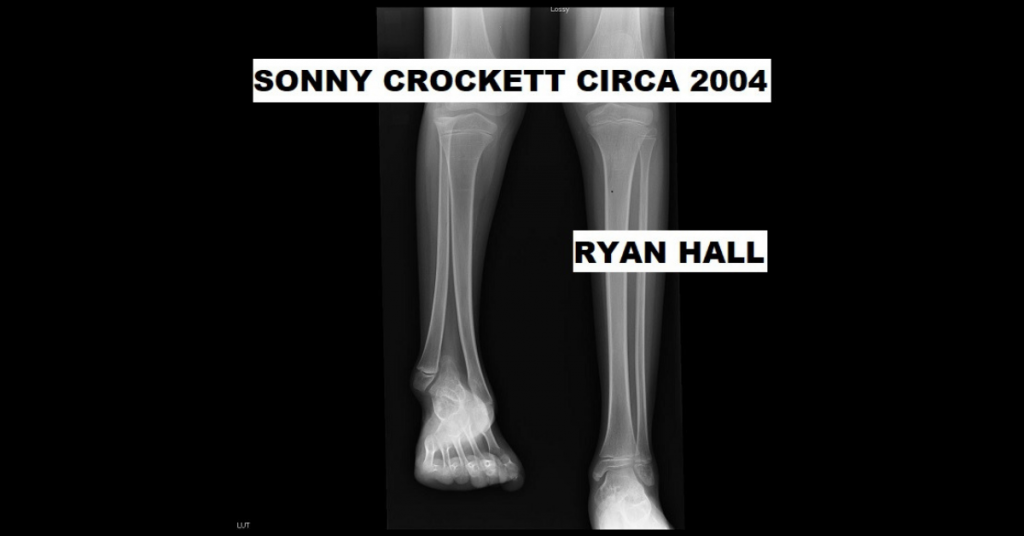

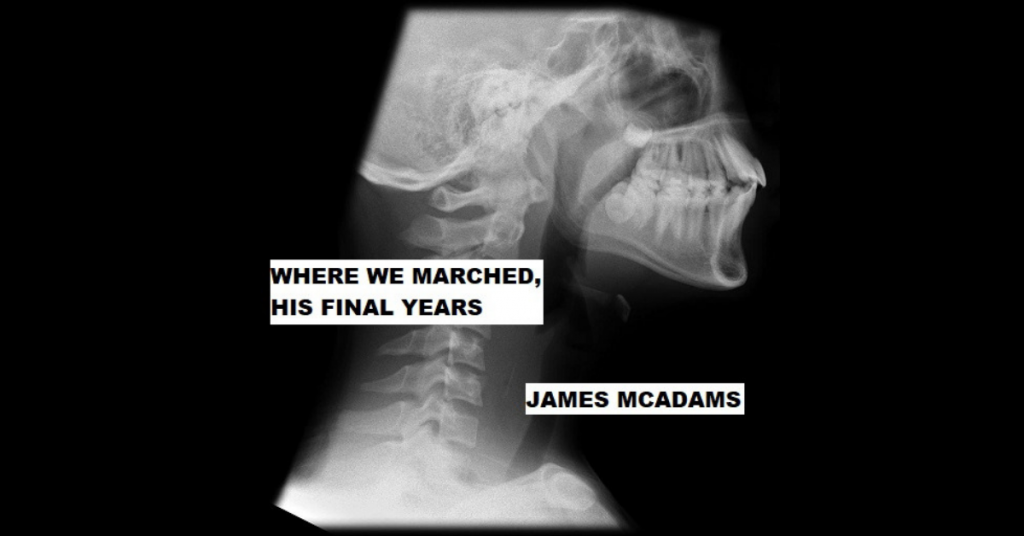
WHERE WE MARCHED, HIS FINAL YEARS by James McAdams
Here’s a pic of Dad and me marching at the Inauguration Protest, January 20th, 2017, he’s holding the IMPEACH TRUMP sign I duct-taped to his hand. He voted for Trump but that didn’t matter—what mattered, according to his neurologist, was that he get fresh air, sunlight, and exercise, away from the confinements of Lush Horizons. This one, yes, that’s him marching with the pink Breast Cancer Awareness cap at the Women’s March, January 21st. His gait palsied, hands slapping the air, mind still in the 60’s, the decade he said changed everything, the decade I was born.
At the airport, on January 28th, we marched against the Trump Travel Ban.
In the county park, on April 29th, we marched for People’s Climate Change.
During the marches, he had lucid moments when he’d look around at the spectacle of half-clothed college students taking Instas and Snaps, middle-aged women screaming into megaphones like rock stars, the squeal of the vuvuzelas. He’d croak my name questioningly but I’d just push him on, saying “Everything’s okay, Pop,” as he glanced skeptically at his T-shirt captioned “LIAR” in Republican colors.
Was it wrong of me to do this? Maybe it was because every time I watched the news I thought of him, a sort of “double consciousness,” always arguing against him in my head.
“You love him too much,” my therapist said.
“I can’t stop thinking of him,” I said.
She smiled, folding her hands. “Love can be a very frustrating emotion.”
Is my account of Alzheimer's just literary, a figuration, a synecdoche for media saturation? When Obama was elected, Dad, still lucid, entered a different world. FOX News. Drudge Report. Breitbart. Limbaugh. Our weekly dinners devolved into polite discussions about the weather and traffic, tending to Mom’s grave, was I dating any special women. I was 52, he was 75. We’d drink two Yuenglings then shake hands. He spent his days reviewing the HOA budget for his condo association, walking the streets to ensure nobody had modified their external structure.
We joined the National Pride March, June 11th.
We joined March for Black Women, September 20th.
We joined March for Our Lives, March 24, 2018, three weeks before I removed him from the ventilation machine.
After March for Our Lives, I put him to bed in Lush Horizons, changing his diaper and applying lotion to his lower joints. He was exhausted, but made a clicking sign that meant turn on the TV. FOX was running a story about Hillary’s servers. Dad sighed. I remembered that sigh from childhood, when I’d appear at the dinner table with black nails, claim Reagan was a war criminal at family parties, refuse to attend church.
I got into bed with him and secured the bed rails. “I love you too much, is the problem,” I whispered.
He motioned me closer, his face grimacing, and pointed at the TV. “Lock her up.”
“Yeah,” I said, placing another pillow under his withered head. Then I rested my cheek against his heart, back like when I had nightmares. “Lock her up, Pop.”
THE BROKEN TEETH DIARIES by Joe Bielecki
We used to be in a mouth but were evicted by a fist in the winter outside of a bar by a bouncer. We weren’t unhappy in our home, but we didn’t mind being free from being drowned in alcohol and choked by smoke every day. The snow was cool. We hibernated like little white bears.
We mingled with razor sharp salt that was used to tear through the ice that the snow was packed down to create. Our enamel was scraped away slowly. Small cracks formed and were filled with melted snow that froze in the night and expanded and widened the cracks so that more water could fill them so that they could widen more so that more water could fill them.
We were not shaped like teeth when spring came. More just little white pebbles mixed in with the gravel. Listening to the sounds of downtown. Spreading far and wide under the feet of passersby.
We were joined or joined other teeth. Fallen from homeless or babies. There was no difference here on the ground. We formed a network. All the pieces forgot the mouth that they came from. The old home means nothing to the mindful. We formed a hivemind. Mapping the city. The downtown, the outskirts, the metro area, every nook and cranny and dark alley and sewer drain.
The summer was a young woman screaming FUCK YOU into her phone over and over. Whoever she is talking to only getting milliseconds to respond or make their case. We would like to comfort her. To smother her insides with chocolate or potato chips. To filter vodka down her throat.
We are the ones who devour the food dropped by spoiled children and full bachelors. We still do our best to perform our function. We have one job.
In the fall we watched as the city destroyed people. Businesses crippled working men with exhaustion and bitterness. Hospitals turned sick kids into drug addicted teens. Crippled and bitter men turned wives into mistresses and children into bartering chips. We are the gravel under bare feet cutting into toes overhanging flip flops and sandals. Scuffing shiny shoes.
We have just become rocks in a tumbler. Doing our small part to do whatever it is that we actually have to do. We have seen the grand scope but not the big picture. But we have no desire to. Too much figuring makes us dizzy. Grinding us into dust and blowing us into the eye of a small child staring at the buildings towering above her.
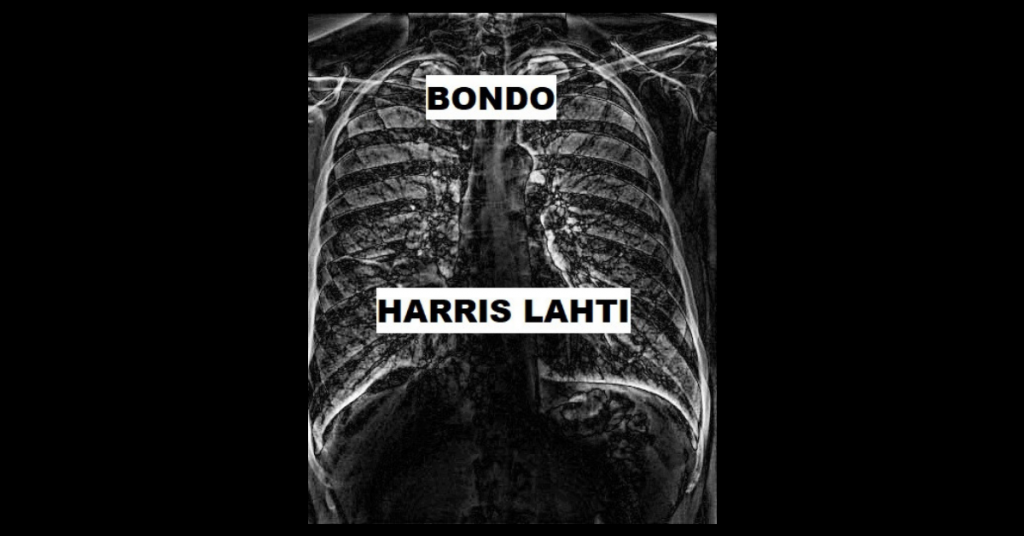
BONDO by Harris Lahti
That summer I started working at Lexington Home for minimum wage. I spent shifts convincing residents to swallow pills brimming from paper cups. It was a powerful position. Or at least that’s what I told friends. I told them I could’ve swallowed every pill if I wanted. But the only question anyone ever asked was: “What happened to you?” I was permanently limping. My hips, shins, elbow were riddled with lumps and eggs. The city of Albany was full of cracks that stopped skateboard wheels dead and, it seemed, I’d found every one. I discovered the pink goo of car Bondo worked best for patching. In minutes it formed a hard, smooth layer. At night I dreamt of a seamless world where one could roll forever. Back then, friends were everywhere, too plentiful. It got so the nerves inside my face ached from laughing. I decided skateboarding was a legend factory. One night, we branded our legs with a hot iron then went dancing until the blood filled our socks. On the way home, we stole things from the park. Our best find was a billboard-sized Christmas sign depicting a happy Santa tossing presents that we stole from an unlocked shed. We plugged it in and blew the fuse of the apartment before he could toss any presents though. A week later someone went to the hospital with a staph infection while my own self-inflicted wounds healed nicely. The small miracle made me feel powerful. Other times I thought I might die I was so fragile. I called out of work constantly. But they refused to fire me. I hit another crack and separated my shoulder. It healed all wrong and began hanging awkwardly from my bones, straining the muscle over my heart. For a short time afterward I became convinced I was having a heart attack and admitted myself to the hospital. When the ER nurse asked me if I’d had any drugs, I lied and said, “No, never.” She brought me pills brimming a paper cup and told me I was okay to go. I tossed them back, showed her my tongue but she wasn’t looking. On my way home, I kicked over garbage cans, thinking I’d run into someone. I didn’t know where anyone was anymore, it seemed. I tried remembering if I’d called out of work already, if I should go in. Behind one can, I discovered a painting of Black Jesus rimmed in heavenly light. I carried it home and scrubbed the glass with Windex to give my new savior a brighter domain. Why had I started working at Lexington Home in the first place? I wondered. Black Jesus didn’t know either. Was it an ad in the paper? Sometimes I thought I just showed up at Lexington Home without invitation and slipped in among the residents, all seamless. Other times it was even less deliberate. Regardless, as I limped the halls that day, a happy Santa tossing out pills, electricity surged through my cracked bones as the residents shivered and rolled out their tongues.
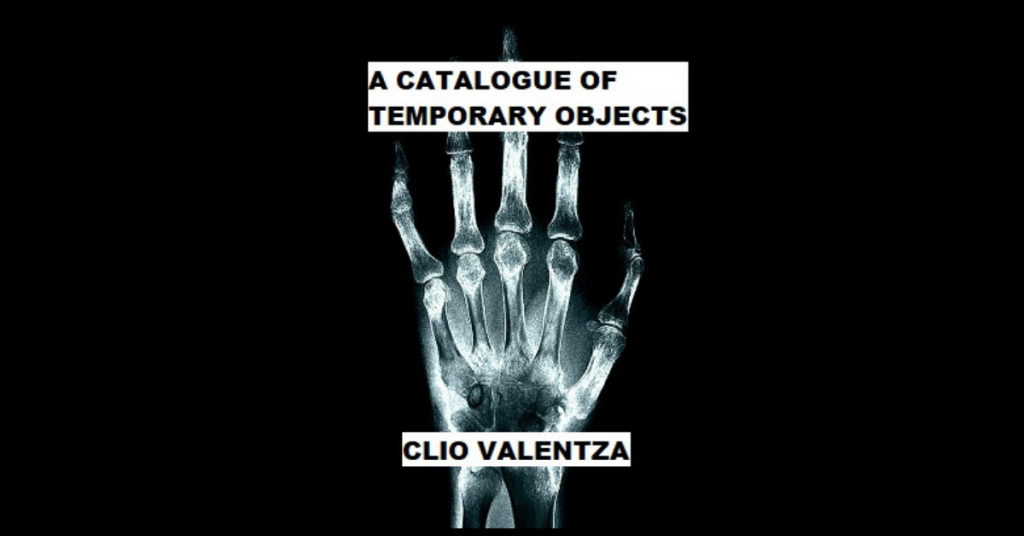
A CATALOGUE OF TEMPORARY OBJECTS by Clio Velentza
One by one they sat for their portraits. Littlest ones first. They stopped at the door and undid their braids. They rubbed their hair with vinegar and pinched their cheeks. The oldest ones were fearsome, they didn’t know how to listen anymore. One pricked her finger and spread the blood on her lips. They rolled up their ribbons and stuck them in their shoes. They spat and brushed their eyebrows. One by one. Littlest ones first, these ones still had hope.
The photographer had one grey eye and one black. He would close an eye to look at them, and then the other. The grey eye was polite and dim. The black one was the one they liked best, because it seemed to tell the truth. Then he hid underneath the cape of the machine. The headmistress thought it looked too much like he was putting his head under a skirt.
The stool was perilously high and had a cushion embroidered in Latin. The littlest ones sat squarely. The oldest ones parted their knees a finger’s width. The headmistress slapped those shut.
“We’re looking for parents, not husbands.”
The photographer took his time. Every now and then he emerged and observed them for a while with both his mismatched eyes. The littlest ones laughed at that. The oldest ones sometimes teared up, sometimes clutched at their chests as if recalling something urgent.
flash
“What are you making?”
“A catalogue of temporary objects.”
flash
“What is an object?”
“What my black eye can see.”
flash
“What is temporary?”
“What my grey eye can’t see.”
flash
“Am I an object?”
flash
“Am I temporary?”
One by one they sat. One by one they stepped off the stool, blinded by the light.
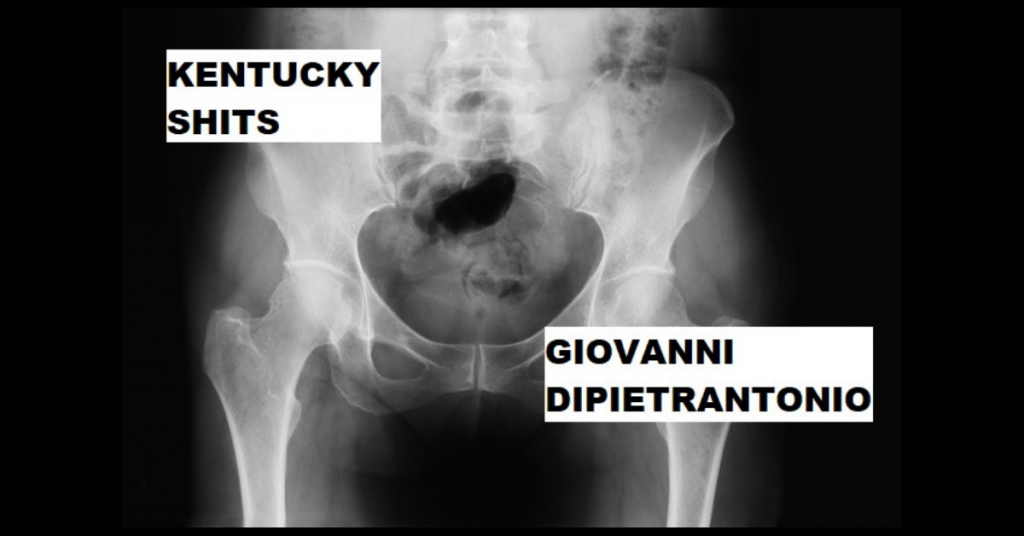
KENTUCKY SHITS by Giovanni DeJaneiro
Steven lived alone in a small house on a cattle ranch at the bottom of a hidden valley. He didn’t have city water, air conditioning, or internet. The kitchen stank. Empty beers crowded the table and counters and stovetop. A flyswatter hung on the wall—flies hummed through the air. Dishes towered in the sink. Bright orange slime curdled in a dirty saucer, seemingly the source of the hideous reek.
He inflated a mattress in the family room, where a floral couch faced a huge wood stove. Grains of rice, toenail clippings, bottle caps, and dirty tissues overspread the coffee table. Envelopes and invoices carpeted the carpet alongside coins and coasters and crumpled socks and another flyswatter.
The mattress deflated while I slept. I woke up on the floor. Steven wasn’t awake. I took a shit and washed my hands. Stripping down, I tiptoed into the tub. I let the water warm and danced under the stream.
Fifteen minutes later, the water choked and ceased.
The water deliveryman said he couldn’t refill the cistern until Monday. Steven had to wash up with bottled water in the bathroom sink. We agreed not to shit in the toilet. I told Steven I would shit at the library. But I clenched my ass until I didn’t have to go.
I sat on the porch and watched Steven leave for work. I would have been at the office had I not decided to quit. I elbowed my brain and feigned gratitude, but then I took a hit and forgot. Fat cows grazed in the green hills and birdsong twinkled in my ear. The landlord’s guard dogs, tongues dangling, bandied into my arms and shed handfuls of dirty coat as soft as warm crayons. The sun smiled like my grandma and even the wasps seemed lazy.
But I couldn’t relax. Dry mouth and bad breath and eye boogers, dog shit, bullshit, dead flies and glue traps swarmed my mind, among other things. I felt like a fugitive. I managed to smoke the feeling out of my head, as well as every thought until I achieved dementia.
I never worried about smoking myself stupid—a return to innocence would have been a happy turn of the screw. No, I worried about smoking myself eccentric and unemployable. I took another hit and blew my brains into the ether.
When Steven came home, we ate bad pizza and drank vodka with Coke. We both drank too much. Steven caved and took a shit he couldn’t flush. I tried to browse porn on my phone, but I didn’t have enough bars.
Steven seemed exasperated after his shit. I laughed at him.
“Hey, are you sure you don’t want me to pay some rent where I’m here?”
“No. You’re my guest. You can stay as long as you want.”
“Okay, cool. I’m not going to move in, you know. Remember, I’m going to Colorado the week after next, so I’ll be out of your hair soon.”
“So, why exactly do you want to move to Colorado again?”
“I don’t know—a change of scenery. Mountains, I like mountains. And weed is legal—”
Steven smiled.
“Bullshit. You’re full of shit. I know why you’re going.”
I made a funny face.
“Why?”
“Because of that girl, right?”
“I don’t know what you’re talking about.”
“Look, man, I don’t mean to doubt your judgment, but I have to say, I’m a little worried. She requested me on Facebook—”
“Yeah, I told her about you.”
“It says she’s in a domestic partnership with someone. Is she married or something?”
“What? No. She has a boyfriend, but I don’t like him. I mean, I’m definitely a homewrecker. But this time I paid for the home I’m wrecking.”
“What do you mean?”
“I mailed her five hundred dollars last month so she wouldn’t have to sell her car to make rent. It’s just that she gets her license next month, provided she doesn’t have another seizure. She’s so close, and I would hate for her to have to sell her car, and I love her—”
“I’m not trying to tell you what to do or anything, but you should be careful. So she doesn’t take advantage of you.”
“She’s not, no, it’s not like that. I also bought her some concert tickets and a stuffed animal for her birthday, but she didn’t expect or ask for any of those things, you know?”
“Okay, I hear you. You know her better than I do. I’m just saying, in my experience, poor people can’t love.”
“Is that right?”
“Look, all I’m saying is, be careful. You want another beer?”
“Sure.”
“Okay, get it yourself. Get me one, too.”
Steven waddled toward the bathroom.
“I’m probably going to shit myself. Jesus Christ! Was there a time when I didn’t have to shit myself? I guess this is what it means to be a prisoner.”
I tried to browse porn again, but the page wouldn’t load. I also tried to look up the average salary of technical writers in the Milwaukee metropolitan area. But the page wouldn’t load.
“Stay out of the bathroom for a while.”
I chuckled and changed the subject.
“I’m so fucked, man. I don’t know what I’m going to do. I shouldn’t have quit. I should have learned how to code!”
“Maybe, but I think you would kill yourself if you were a coder.”
“Yeah, probably. I don’t know how you do what you do. I know I couldn’t.”
“Well, I’m only working where I’m working because I want to buy the company eventually.”
“What, really? How?”
“They offered me stock options when I started, but I don’t think it’s going to happen. They’re full of shit. The reality is that I’m lucky they haven’t fired me. And if I don’t make $300,000 by the end of the year, they might.”
“Damn, man.”
“Yeah. I’m in sales because I could make a lot more money faster than any engineer. That’s the carrot they dangle in front of me, anyway. It’s not bad, but I don’t like it. It’s about the money. Why do you think people do it? It’s funny, my manager told me, you work hard, you buy a Porsche and a nice watch, and then you get a girl. I’m like, is that true? And he’s like, yeah, that’s what I did! I knew my character wasn’t going to get me by. That’s why I put a spoiler on my car.”
“Well, goddamn. I don’t know, man. That’s bleak. I can’t believe people live like that.”
We laughed. I raised my voice.
“Don’t you want to FIRE, man?”
“What’s that mean?”
“Financial Independence, Retire Early, man! I’ve been reading this Reddit, the financial independence Reddit, and these people, they’re like bankers and coders and shit. They advocate living below your means and putting your savings in stocks so you can retire early.”
“That’s just spastic retard shit. I actually talk to CEOs and people in charge of shit all the time, and once you’ve heard enough about the way stocks are, you know, created, you realize it’s all bullshit. It’s made up.”
“What, you don’t want to retire early, man?”
“Retire early? For what?”
“I don’t know, some people said they want to play video games in solitude, you know.”
“So? They can play video games anytime.”
“But they want to play video games all the time—some of them.”
“Well, good luck with that. Hey man, I’m sorry, but I don’t feel too great. I’m going to go to bed, alright?”
“Hey, that’s fine. Farewell and goodnight! Feel better, man.”
“Thanks. Goodnight.”
I woke up in the middle of the night with a stomachache. I unspooled a wad of toilet paper and stumbled outside. The guard dogs barked and howled somewhere in the valley. I thought they might ambush me. Panicked, I fumblingly unbuckled my pants and squeezed runny shit in the grass behind the barn. The odor gagged me. More and more dogs began to bark and howl. I braced myself for a fight.
The dogs didn’t show. I wiped my ass and attempted to scoop the wet pile into a plastic bag. Liquid shit speckled my fingers. I sniffed them and threw up. My stomach finally settled. I tossed the bag of shit and went back to sleep.
The next day, Steven still had the shits. He thought he might have to go to the hospital, he shit so much. I held my shit, but I had to piss in the toilet several times. We slowly flooded the toilet.
It was too hot to go outside. Having sweated all day and all night, grease slicked my skin and I couldn’t breathe through either nostril. Using his phone as a mobile hotspot, Steven streamed a South Korean police drama on his laptop. We watched thirteen hours of the show, pausing only to piss and shit and order takeout.
Steven insisted I try Joella’s Hot Chicken.
“No, I want the real thing. Let’s get some Kentucky Fried Chicken,” I drawled in a terrible southern accent.
“I’m telling you, they don’t have KFC in Kentucky.”
“No way, I definitely saw a KFC near the highway.”
“Well, yeah, there’s KFC, but they’re usually attached to Long John Silver’s.”
“Weird, I’ve only ever seen Taco Bell Pizza Hut.”
“Have you tried Cincinnati chili?”
“What, that orange shit in your sink?”
Sunday afternoon, the water deliveryman came. I watched him back up the driveway in a red pickup with a rusty tank chained to the bed. He slipped a green hose inside a hole in the front yard and poured forty dollars of water into the cistern. Here’s a productive member of society, I thought, a pillar of the community.
Steven and I cheered when the faucets sputtered water. We could finally flush the toilet—a small victory. I could smell my crotch through my jeans, so I immediately took a shit and a shower.
When the cistern ran dry, I thought I was roughing it, but I couldn’t imagine having no electricity, no clothes, no shelter, least of all no money to spin the situation. The house could burn down, my car could blow up, my clothes could shrink and my family could die. I would still have enough money to live.
I couldn’t believe I had quit my job and wound up staying rent-free in a quaint home on an isolated cattle ranch in rural Kentucky. People aspire toward my rock bottom, work their whole lives away. I feared the worst was yet to come.
I stared at the ceiling and contemplated suicide. I suppose I should have been grateful for my life and my friend and running water, but I felt undead and lonely and thirsty. I suppose I should have been grateful for the opportunity to kill myself, but I couldn’t decide how I wanted to die.
I didn’t want to shoot myself because I’m a lousy shot. I didn’t want to jump because I’m afraid of heights. I didn’t want to slash my wrists because I’m squeamish. I didn’t want to overdose because I might wind up merely brain-dead, a drooling caricature in a bed of medical bills, confined to my mother’s basement for the rest of my life.
My mother didn’t want children, she wanted dogs. Turns out she’s allergic to dogs. But she wasn’t back then. I couldn’t understand why she bothered to create me. Childbearing is busywork, childrearing a career all its own. She must have loved my father.
I would’ve liked to have been a dog. I could have shit anywhere. I opened the fridge and grabbed several slices of raw bacon. I sat on the porch. Waving the bacon, I watched the guard dogs scamper toward me.
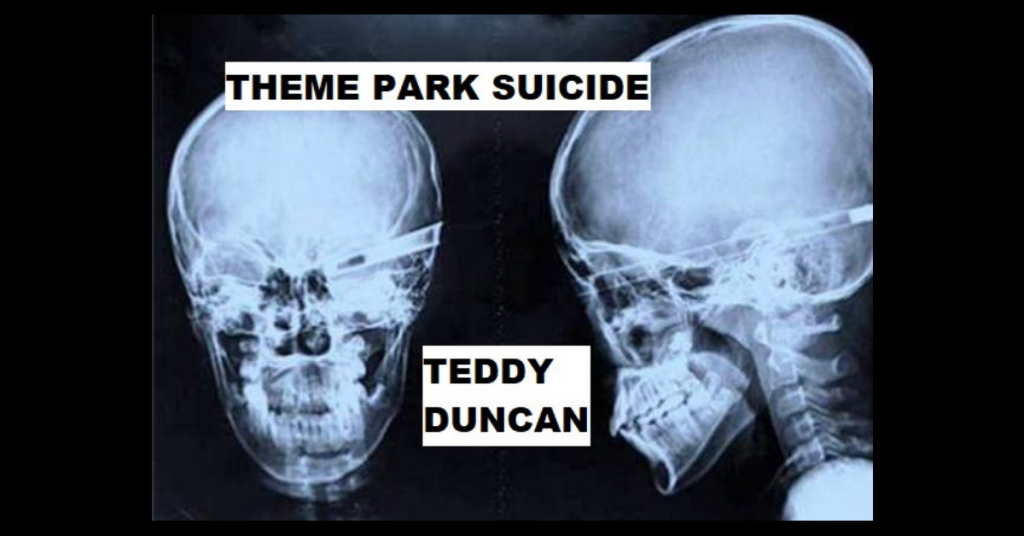
THEME PARK SUICIDE by Teddy Duncan
I'd been to six flags before and I knew that there was a ride called goliath that you could manually unbuckle the seat belt even after the ride had begun. I don't fully understand what I was thinking at the time but I don't think anyone does when you get away from a sickness like that, like when you have a stomach ache and forget what it feels like for your stomach to be normal and you wish and hope and pray for it to be normal and for the stomach ache to end, so that normal becomes a glorious thing. But when you're normal again you remember there's nothing great about normal, it's just the absence of bad but not necessarily good and when you're normal you don’t even understand why you made such a big deal out of a stomach ache. That's the position I'm in now. I did something drastic over something I now see as ordinary. I went to six flags by myself so I had to get in the single riders line with families and couples who intended to get through the line quicker but really didn’t want to ride by themselves and didn’t actually expect someone to come to a theme park by themselves and to actually ride a ride by themselves. I wanted someone to know, and I didn’t care who was on the ride with me. I knew I wouldn’t have to deal with the result and that everyone would just know I was dead or momentarily think I was just really hurt. The one’s that do it alone in their rooms are the brave ones, the one’s that can just pull a thoughtless trigger or put their heads through a loop in a rope, I just didn’t buckle my seatbelt. Well I did at first when the bored 16 year old employee came and tugged at everyone’s crotch to make sure that their seatbelts were secure. After he checked my row and went onto the next I just pressed the button and put my arm over the belt to make it look like it was still clicked into place. I could have waited until the ride started to unbuckle my seatbelt so I wouldn’t have to risk an employee seeing that my seatbelt was off and maybe seeing my bloodshot suicide eyes and making me leave. I was too pussy to do it so close to my actual death. I was just going to ride the ride like normal and try to forget that I wasn’t fastened by anything and when the first sideways loop came instead of being pushed up against the seatbelt I didn’t push against anything and went sprawling through the air for maybe 2 total seconds of fear before impact. I just really didn’t want to feel alone when I died, no matter how fucked up it is if I was going to do it I needed an audience.
This micro-story is part of an unpublished fiction chapbook that no one's fucking with, so if you like this and publish small books/chapbooks hmuuuuu here.
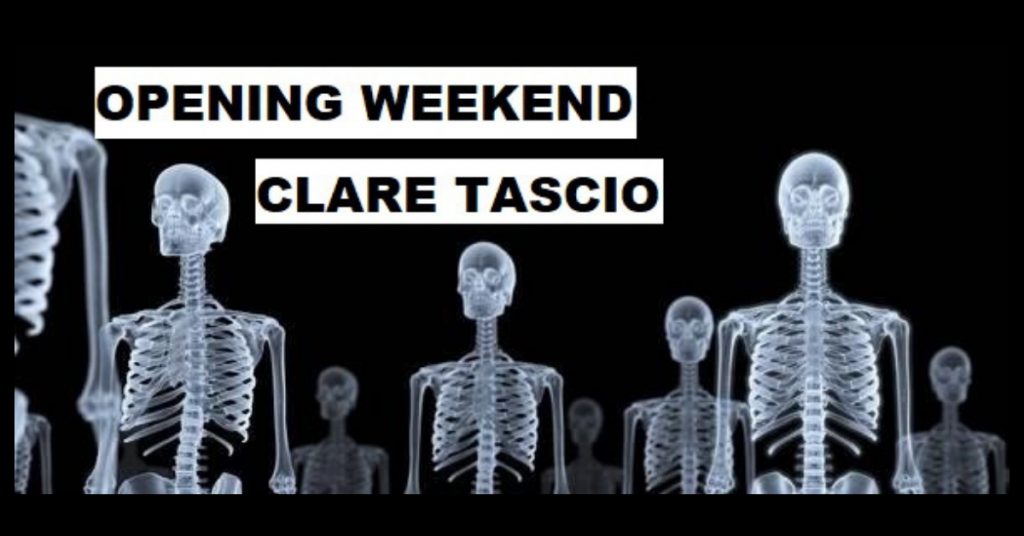
OPENING WEEKEND by Clare Nazarena Tascio
OPENING WEEKEND
THE HARD PART IS THAT IT ISN’T HARD.TO GO ON LIVING. AFTER. THE LIVING JUST…GOES. JUST GOES ON AND ON! WITHOUT ME. AND I HAVE TO WATCH IT GO. AND I CAN’T CATCH UP TO IT. AND I CAN’T REALLY WANT TO. SO IT GOES. ON AND ON. SOMETIMES I SIT IN THE FRONT ROW, BECAUSE NO ONE WANTS TO SIT IN THE FRONT ROW, AND BECAUSE IT’S LIKE SITTING REALLY CLOSE TO A BONFIRE. I WANT YOU CLOSER AND BIGGER. BUT SOMETIMES I SIT ALL THE WAY IN THE BACK. WHEN I’M THAT FAR AWAY FROM YOU I FEEL THIS HARD FISHING LINE PULLED TAUT BETWEEN US. LIKE I’M TESTING HOW FAR I CAN GO, BEFORE YOU SNAP ME BACK TO YOU. I LIKE THAT. IT FEELS LIKE I’M TOUCHING MYSELF EVEN THOUGH MY HANDS ARE ON THE ARM RESTS. I ALMOST COME. I DON’T LIKE SITTING IN THE MIDDLE OF THE THEATRE. IT FEELS LIKE A TRAP. OTHER PEOPLE END UP SITTING NEAR ME, AND I CAN’T PRETEND IT’S JUST THE TWO OF US IN THE WORLD. I DON’T WANT ANY FRIENDS, AND I DON’T NEED ANY FRIENDS, AND NOW I’M GLAD I DON’T HAVE ANY FRIENDS, BECAUSE IF I HAD FRIENDS, THEN THEY WOULD HAVE THEIR OWN OPINIONS ABOUT YOU, AND THEN THEY WOULD RUIN YOU RIGHT TO MY FACE. I STARTED GOING TO THE MOVIES A LOT, SO I COULD BE IN A DARK PLACE THAT WASN’T MY BED. SO I COULD BE AWAKE, BUT ALSO ASLEEP. THAT’S WHEN I SAW YOU. I ONLY BOUGHT A TICKET TO SEE YOU BECAUSE YOU WERE TWO HOURS AND FORTY MINUTES LONG, AND I WANTED LONGER AND LONGER MOVIES, TO MAKE THE DAY SHORTER AND SHORTER. I LIKED EVERYTHING ABOUT YOU. YOUR FRAMES. YOUR COLORS. YOUR SOUNDS. YOUR PACING AND YOUR SILENCES. I FELT A FLICKER OF SOMETHING, LIKE WHEN YOU START TO FALL IN LOVE WITH SOMEONE, AND YOU CAN ALREADY SEE HOW FAR THAT DROP IS, AND YOU KNOW YOU’RE GOING TO GO FOR IT ALL THE WAY. I’M SAYING I FELL IN LOVE WITH YOU THE FIRST TIME I SAW YOU, AND I CRIED WHEN YOUR CREDITS ROLLED THAT FIRST TIME. MY THERAPIST TOLD ME TO FIND THE “LITTLE THINGS.” SIMPLE THINGS I COULD ENJOY. SHE TOLD ME TO GRAB HOLD OF THEM WITH BOTH HANDS, NO MATTER HOW STUPID OR CHILDISH THEY MIGHT SEEM! I COULD SPEND ALL DAY BLOWING UP BALLOONS JUST TO LIKE HOW THEY LOOKED CROWDING MY BEDROOM! I COULD VISIT TEN PET STORES IN A DAY JUST TO PET THE PUPPIES AND KITTENS!WHATEVER. I DIDN’T WANT TO FIND “LITTLE THINGS” TO ENJOY. WHAT A WASTE OF TIME. WHAT AN INSULT TO MY ESSENTIAL HUMANITY, WHICH I THINK, FOR EVERYONE, IS A STRETCHING TOWARD “BIG-NESS.” AND THEN I FOUND YOU. AND YOU WERE BIG. YOU WERE LONG, AND RAMBLING, AND BEAUTIFUL, AND FULL OF SO MUCH, AND NOTHING HAPPENING, AND EVERYTHING HAPPENING TOO. YOU MADE ME FEEL LIKE I WAS FALLING IN LOVE. WITH WORLD. WITH NOT BEING DEAD YET. I DECIDED THAT SINCE I COULDN’T KEEP UP WITH THE PACE OF MY OWN LIVING, I WOULD KEEP PACE WITH YOU. I DROPPED OUT OF SCHOOL. GAVE UP MY APARTMENT. CHANGED MY PHONE NUMBER. FILLED A GARBAGE BAG WITH CLOTHES. BOUGHT A NOTEBOOK AT THE GAS STATION, AND DROVE. TO EVERY CITY AND EVERY THEATRE THAT WOULD PLAY YOU FOR ME. YOU, FLUNG UP SO BIG ON THE SCREEN, THROWING LIGHT ALL OVER MY CRUMPLED BODY IN MY DIRTY HOODIE AND JEANS IN THE FRONT ROW. I DON’T NEED SLEEP. I BARELY NEED TO EAT. COFFEE IN THE MORNING, AND LEFTOVER CANDY, WHILE THE SUN RISES OVER THE HIGHWAY. SOMETIMES WHEN THERE’S A RAMP GOING UP ON A BRIDGE OR SOMETHING, I FEEL LIKE I’M GONNA DRIVE RIGHT INTO THE FUCKING SKY. AT NIGHT, IT’S RED BULL AND STALE POPCORN FROM THE DAY BEFORE WHILE I FIND THE NEXT THEATRE. ONCE I FIND IT, I BUY TICKETS FOR EVERY SHOWTIME I CAN THAT DAY. IF TWO SCREENS ARE PLAYING YOU AT ONCE I SOMETIMES WATCH YOU ALMOST ALL THE WAY TO THE END, THEN SLIP INTO THE OTHER SCREENING, TO WATCH YOU ALL THE WAY TO THE END AGAIN. IT FEELS INCREDIBLE THAT WAY. IT IS CLEAR TO ME YOU ARE A MUCH MORE LOVED THING IN THE WORLD THAN I CAN EVER BE. NO MATTER WHAT THEY SAY IN THE REVIEWS. THE REVIEWS ARE BULLSHIT. I THINK ABOUT HOW MANY PEOPLE CAME TOGETHER TO MAKE YOU, AND HOW MUCH MONEY AND TIME WAS PUT IN TO BRING YOU TO THE SIZE YOU SHOULD BE, AT THE SCALE YOU DESERVE. NO HUMAN HAS HAD SO MUCH TIME AND MONEY AND PEOPLE PUT INTO THEM. SOMETIMES I THINK THAT A PERSON’S LIFE IS A LOT LIKE THE LIFE OF A MOVIE IN A THEATRE. OPENING WEEKEND IS A PERSON’S LIFE AGE 1-18. YOUR FIRST FORAYS INTO FINDING YOUR PLACE IN THE HIERARCHY OF PEOPLE. YOUR FIRST EXPERIENCES WITH BEING PUT DOWN, CRITICIZED, OR PRAISED. PEOPLE WILL CONTINUE GIVING THEIR OPINIONS ABOUT YOU FOR THE REST OF YOUR LIFE, BUT THAT FIRST WEEKEND OF LIFE SHAPES THE REST THAT WILL COME LATER. NO APPRECIATION LATER ON DOWN THE ROAD WILL CHANGE THE WAY YOU WERE TREATED THAT FIRST WEEKEND. THOSE FIRST INSULTS. THOSE FIRST COMPLIMENTS. YOU NEVER FORGET IT. THIS OPENING WEEKEND DETERMINES HOW LONG YOU WILL BE AS BIG AS YOU WANT TO BE. HOW LONG YOU CAN HOLD YOUR OWN ON A BIG SCREEN. BEFORE YOU ARE DEMOTED TO TV SCREENS, LAPTOPS, TABLETS AND PHONES. YOUR FORM COMPRESSED TO SMALLER AND SMALLER VESSELS. SO WE COMPRESS OURSELVES. AND TELL EACH OTHER TO TAKE PLEASURE IN THE “LITTLE THINGS.” AFTER WE ARE RAPED BY THREE BOYS IN OUR COLLEGE DORM. TAKE PLEASURE IN LITTLE THINGS, BECAUSE BIG THINGS ARE NOT FOR YOU ANYMORE. YOUR LIFE. YOUR SELF. GETS A BAD RAP. PEOPLE SAY SHIT ABOUT YOU. THEY SAW THE VIDEO AND THEY STILL SAY SHIT ABOUT YOU. I DON’T WANT TO LIVE MY LIFE ON SMALLER AND SMALLER SCREENS. YOU ARE THE THING THAT MAKES ME FEEL ALIVE, EVEN THOUGH I’M NOT TALKING. NOT MOVING IN MY SEAT. BARELY BREATHING. YOU ARE MY LIFE NOW, TWO HOURS AND FORTY MINUTES. THEN ANOTHER TWO HOURS AND FORTY MINUTES. MY DAYS AND NIGHTS EXIST ONLY IN THIS INTERVAL: TWO HOURS AND FORTY MINUTES. THERE WILL COME A DAY, AND VERY SOON, THAT I WON’T BE ABLE TO FIND YOU ON A BIG SCREEN ANYMORE. THIS IS A LITTLE LIKE RELIEF, THAT THERE IS AN END IN SIGHT, AND A LOT LIKE GRIEF. I WONDER IF THOSE BOYS FELT EVEN A MICRO-BIT OF THE FEELING THAT I FEEL WHEN I’M WATCHING YOU. WHEN THEY WATCHED ME. THEN LATER WHEN THEY RE-WATCHED ME ON THEIR PHONES, ON THAT VIDEO. HOW DID THAT FEEL TO THEM? COULD THEY HAVE FELT ANYTHING AT ALL? THE DAY I SAW THAT VIDEO WAS THE DAY I STOPPED LIVING AT THE SAME PACE OF MY LIFE. THERE I WAS. SO SMALL. SO MANY PIXELS OR BITS OR WHATEVER THE FUCK. SUCH A SMALL SCREEN. IF THAT MOVING PICTURE OF ME WERE TO CLIMB OUT OF THAT LITTLE SCREEN I COULD CRUSH HER WITH TWO HANDS LIKE A MOUSE. MAYBE I WAS SIMPLY ONE OF THOSE “LITTLE THINGS” THOSE BOYS ENJOYED IN LIFE. BUT IF YOU WERE TO CLIMB OUT OF THE SCREEN YOU ARE ON, AND ACHIEVE A PHYSICAL FORM, YOU WOULD BE BIG. I WOULD BE THE MOUSE. AND YOU COULD CARRY ME IN YOUR POCKET, UNTIL I BLOOMED INTO A GUN.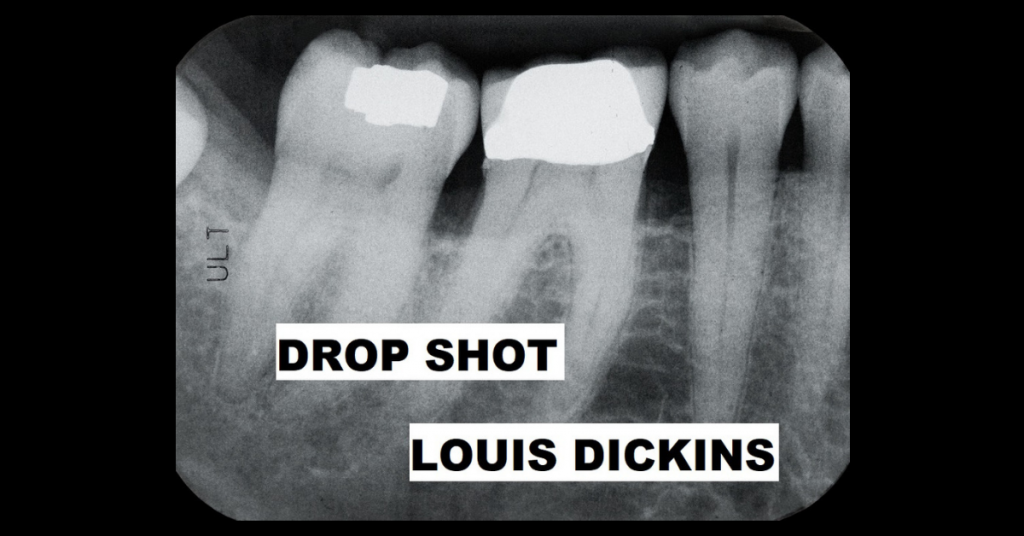
DROP SHOT by Louis Dickins
Sonia is ashamed of her husband.
She’s sitting with a crowd of people at the local tennis courts in horror, as her husband Paul prepares to serve. He hasn’t won a game, and he and his opponent are deep into the third and final set.
It’s a hot, windy day at the South Morang Tennis Club. There’s a barbeque sizzling in the corner and cups of cordial set up for the kids. It’s the quarterfinals of the local tournament, and Paul’s lifelong dream of winning the cup is being violently dismantled.
At 48 years old, Paul is seriously overweight and has onset emphysema from years of chain smoking. Paul’s heritage is Albanian, immigrating to Australia as a ten-year-old, he loved the place immediately and connected to the nation’s love of sport.
Unfortunately, he’s being torn apart today by a much younger opponent.
His wooden McEnroe racquet has seen better days - it’s tired and wants to die. His Dunlop volley runners are undone and overcome by depression. Paul is out of breath, his sweat-drenched polo shirt clings against his skin.
He lifts the tennis ball into the air and connects with a powerful serve - off spin, curling into the court. A perfect serve, he thinks, until his opponent hammers it down the line. ‘Christ,’ Paul calls out as he throws his racquet against the artificial grass, ‘I can’t do anything right!’
Paul is a butcher by profession, he’s owned a shop in Richmond since the mid-eighties. His lamb chops are acclaimed by the locals, and he’s well-liked because of his social, happy disposition. His aspiration, though, has always leaned toward tennis and becoming a champion. As a boy, posters of his idols like Rod Laver and Fred Perry hung on his bedroom walls. At night he dreamt of aces and topspin backhands.
What was the defining moment of your life in tennis?
PAUL- Pat Cash’s 1987 victory over Ivan Lendl at Wimbledon. Boy, he played a magnificent match. Wonderful, graceful groundstrokes, ripper serve, and a killer drop shot. And he had presence. Something indefinable… he was magic. I sat transfixed as he played Lendl in ’87, I couldn’t look away. When he won, I started crying, real, physical tears. It changed my life. See, Pat Cash and I are around the same age, and we both grew up in Melbourne, so in a way, it was like I won Wimbledon, truly.
What is it about tennis you love?
PAUL- I’m into the unpredictable nature of the game. I thrive on its sense of competitiveness, and I like the community aspect of it. But, really I love the way the ball moves through the air, the sensation of movement. To me, there’s nothing better than hitting the ball with the sweet spot of the racquet, right in the middle. It’s wonderful.
Paul’s down three match points. It’s over. Even Paul’s resilient sense of determination has conceded defeat. He lifts the ball into the air and hits it with his dejected racquet. It lands in but is crushed back cross-court, Paul watching helplessly as the ball bounces away. Done, disappointed, his head sunken, he walks toward the net and shakes his opponent's hand.
‘Good game, mate,’ Paul says.
‘Yeah, Thanks.’
Defeat never changes. It hurts Paul in the same way it did when he was six. His whole life he’s dreamt of winning, the praise and adulation of being the best. Not just trophies and confetti, Paul wants admiration.
On quiet days at his butcher shop, Paul would rest his arms purposefully on the counter, close his eyes and daydream. He could see the shots, the pattern of the rallies, drop shots and smashes. He could see them. Seizing each moment, he could hear the roar of the crowd. He was the man, and this was his game.
In the months he spent preparing for the South Morang Tennis Tournament, he never considered not winning. It didn’t dawn on him that he could lose, it just wasn’t his destiny.
But now, as he shuffles off the court, his racquet packed up across his shoulder, sipping at an orange Gatorade, defeat hits Paul like a pile of bricks. He wasn’t good enough, not even close. Reality hasn’t lived up to his expectations, losing hurts like nothing else.
Inside the clubhouse, Paul walks straight toward the men’s bathroom. He turns on a tap and splashes cold water onto his tired face. He lights up a low-tar cigarette and looks at his reflection in the mirror.
Obscured by his heavy eye bags and grey hair he can still see the ambitious, dream-induced kid he used to be.
As a teenager, Paul had a wonderful tennis coach. They trained together every Thursday night for close to eight years. His name was Frank Price. Unbelievably overweight, he insisted on wearing track suits two or three sizes too small. He had dark black hair, slicked back. Frank was a part-time drug dealer, he supplemented his income as a tennis coach by selling crack cocaine from his car. His dedication to tennis was tremendous. He was not a preacher of push-ups, of weights and treadmills; instead, he was a believer in the beauty and spirit of the game.
Can you describe the influence Frank Price had on you as a young man?
PAUL- Frank believed in me, he understood me. He sat me down one day and told me the most important thing about competitive tennis was eye contact. You could size up and intimidate your opponent by looking at them directly in the eyes, their weaknesses, their insecurities, it was all in the eyes. In terms of style of play, he told me to be creative, to be original in your shot selection. Whatever shot, a lob or a drop shot, you had to hit it with conviction. Don’t doubt yourself, he’d say, don’t second guess your instincts, have belief… I was shattered when he was convicted of drug trafficking, I lost someone very special.
Paul reaches for some paper towel from the dispenser to dry his face, but it’s empty. He sighs and heads outside toward the carpark. Sitting in the passenger seat of their Holden hatchback is his wife Sonia. As he approaches the car, she gives him a smile.
Paul sits down and closes the door.
‘I’m sorry Paul, bad luck.’
Paul doesn’t respond, he sits in silence looking at the steering wheel.
‘It’s ok, Paul.’
Outside Paul can hear kids laughing and locals chatting. The summer wind whistles through the trees as cars go by on the highway. All Sonia can see is a sad, disappointed man.
‘I’m so ashamed,’ Paul says quietly.
‘… Why?’ Sonia asks.
‘Weren’t you watching, Sonia, he smashed me. All those people watched me lose. They saw a delusional old man embarrass himself. Nothing worked for me out there. From the start it was a total train wreck’ Paul removes his tearful headband, ‘All that work and all that preparation and all I did was disappoint myself. I was going to put the trophy up in the window of the butcher shop, I told everyone about this tournament, and I let them down. I let you down.’
‘Paul, no. You didn’t let me down. I’m so proud of you.'
‘What are you talking about,’ Paul says sharply.
‘You gave that match everything you had. You had it all on the line, and you had a crack. Listen to me Paul, the only losers in life are the people who don’t try. Who aren’t willing to have a go, who give up on their dreams. I don’t care about the score, you’re a ripper for trying, you’re a real champion.'
Paul turns to Sonia. Her blue eyes and tied back blonde hair.
‘Ok,’ he says.
He turns the key in the ignition, puts the car in gear and heads back home. It’s a quiet ride as Paul thinks over the match and his opponent. He can’t get over what Sonia just said to him; those beautiful words have slowly lifted his soul. As he puts the indicator on and pulls up at the driveway to their house, his resolution and commitment to tennis have come back. He’s no longer bitter or upset about how the match turned out, he’s starting to move on.
What motivates you?
Paul- You know, for a long time it was emulating the champs like Lendl or Pat Rafter. As a kid, my old coach Frank Price really pushed my buttons. But right now, really it’s Sonia, she just lights me up. She makes me want to be a better tennis player, a better butcher. The best me I can be. I can’t help but be excited about next year’s tournament, I’m already signed up. I can’t wait. And, you know with some hard work, a favourable draw, maybe a new racquet and with Sonia on my side, I think I’m in with a chance of clinching the trophy. Bit of luck here or there and who knows? I’m in love with the possibility of it all.
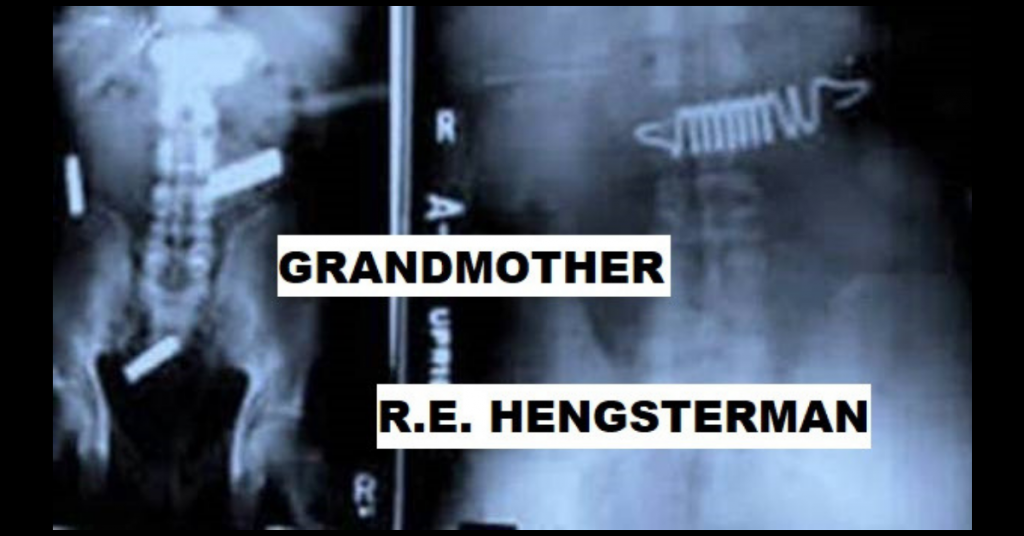
GRANDMOTHER by R.E. Hengsterman
A low metal growl rises, and I leap from the bed.
Ten... nine.
By seven, she's reached the cornered hill of Fletcher and Fields. Her brakes protest with a tinny squeal. By five, I'm half dressed. At three, the throaty rumble of the eight-cylinder engine grows.
By the time I reach zero, Grandmother has arrived. She slides from the bench seat of her station wagon and navigates the piles of dog shit left by our beagle.
Her pink, black-strapped handbag drapes her forearm. Her coifed hair is motionless. She has pressed her clothing into fine lines of order.
Mother, Father, and Grandmother have a silent, transitory meeting on the lawn amongst the dog shit.
***
In the kitchen, Grandmother unpacks her handbag; Kleenex, three pieces of bread, Pop Tarts®, a small change purse, cheese and crackers, a sleeve of thin mints, and a handful of peppermint candies. She is squat heavy and gray but determined to ignore the angry pop of gas trapped within her arthritic joints as she prepares my breakfast. On school days, Grandmother feeds me Pop Tarts® or Thomas’ English Muffins® slathered in butter. On the weekends, when without Grandmother, I resort to sneaking dry oatmeal from the kitchen cabinet.
While I am at school Grandmother tackles the laundry and cleans the house with meticulous detail. In the afternoon, with her chores complete, she appoints herself to the living room couch to watch General Hospital. After school, Grandmother chatters nonstop. She's upset that Mikkos Cassadine has a plan to freeze the world using a weather machine.
***
The following Monday Grandmother was ill. There was no rumble. No tinny squeal. No announcement. Just Mother heavy-footing her way around the kitchen, slamming cabinets and cursing.
“What’s wrong?” I ask.
“Grandmother is unreliable. I’m going to be late for work.”
Mother goes on to tell me Grandmother had visited Grandfather in the Army when they were dating and never left.
“Hung around,” Mother says. “Like a stray dog.”
Your Father says Grandmother is the reason he gets angry. But I believe Father enjoys being angry.
Mother tosses some crackers in my lunch box and says that years back Grandmother drove a red convertible, smoked cigarettes and killed her unborn baby in a car crash. The Grandmother I know is wrinkled and kind. Not a baby killer.
Mother talks all the way to school.
The next day, when Grandmother is feeling better, I tell her what Mother told me. Grandmother says Father is an asshole and Mother is clueless. I’ve never heard Grandmother be foul-mouthed.
Grandmother never missed another day for the entire school year.
***
In the summer Grandmother and I take the old, ugly wagon everywhere. I sit in the rear facing, third-row way-back seat and watch the faces of terrified drivers who follow to close behind Grandmother, and her sudden, unplanned stops. I lip-read as their blood drains. Sometimes a smile jostled by fear escapes my lips. Most don’t smile back. Instead, they honk, shake their fists and flip me the bird. Grandmother flashes a wolfish grin in the rearview before tapping the brakes again.
“Keep them off my rear,” Grandmother says.
***
Today we have lunch at the Apple Knockers on Pawling. Grandmother and I are regulars. They have the best battered, deep-fried fish in town with large pieces of naked Cod poking from the tiny bun. Apple Knockers should buy bigger buns.
Grandmother likes the house-made tartar sauce with her fish. I order the semi-sweet tangy chili sauce, a milkshake, side of homemade cinnamon-flavored applesauce and unsalted fries (you have to salt your own).
We sit in our favorite corner both varnished with a permanent layer of vegetable grease. As Grandmother wipes tartar sauce from her lips, I realize how ordinary we are.
After lunch, we shop at the Price Chopper. For Grandmother, it has the better coupons. For me, the better toy aisle; filled with jacks and paddle balls and weird gum that you stick to the end of a straw and blow into lopsided, ugly bubbles.
On the way home, Grandmother and I pass the Pentecostal Church. Grandmother says I attended daycare there when I was younger, and she still worked at the department store. There’s sadness in her voice. I search my memory but have no recollection of daycare or God or Grandmother working.
“I don’t remember,” I say, and her face brightens.
***
We arrive home in time for Grandmother to settle into her soap. As General Hospital demands her attention, I sneak into the basement and unlock the metal door housing the water well pump. The pump sits in a small stone room cut into the earth. The air inside is dank and reeks of musty dishwater. Using my father’s wrench, I loosen a valve and let water spill onto the dirt floor.
When my parents return home from work that evening, and Grandmother has darted from the house, I ask why they are so mean to Grandmother. Mother brushes me aside, and Father swats at the air above my head.
They prattle. Work this. Work that. There’s no mention of the spotless house, the folded laundry or waxed linoleum floors. I wait several minutes and then interrupt.
“I think I hear water in the basement. Come quick.” I say.
Father rushes into the basement while Mother grabs a handful of laundered towels. It’s the most excitement our house has seen in weeks. Standing at the top of the stairs, I hear wet cotton socks slapping the concrete floor.
“Where’s my wrench,” Father yells.
I say nothing.
Mother and Father submarine into the low-slung pump room. The stone tomb muffles their cursing.
“Come here,” Father screams.
I slip to the threshold of the pump room door, and Father tosses me a flashlight.
“Shine the light here,” he says.
I position the light. “Not there, here!”
As Mother and Father scramble to stop the water, my hand hovers over the brass lock.
***
Days later, Grandmother and I are on the couch. Mikkos Cassadine and his brothers Victor and Tony are held up at Wyndemere Castle on Spoon Island. Luke, Laura, and Robert Scorpio are desperate to stop the weather machine.
Grandmother pinches her eyebrow into a curious arc, smiles, and turns up the volume as Mikkos is seconds away from flipping the switch and destroying the world.
